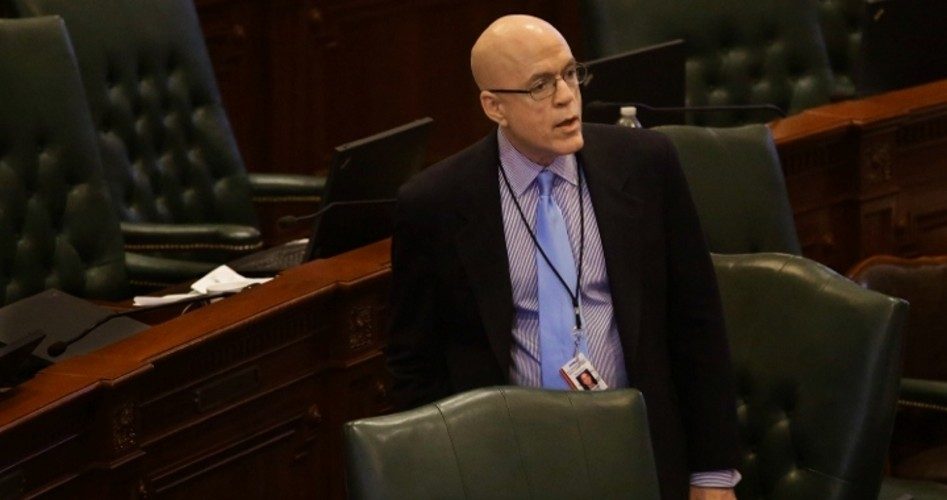
Marriage is safe in Illinois — for the time being, at least. On May 31, the Illinois House of Representatives adjourned for the summer without voting on a bill that would have made Illinois the 13th state to legalize same-sex marriage. The homosexual marriage measure had passed the state Senate in February, and Democratic Governor Pat Quinn had promised to sign the bill into law. But while the Democrats had a majority in the House, Christian and pro-family groups succeeded in building grassroots momentum against the bill, leading some key lawmakers to back off on their support and prompting the bill’s sponsor to pull it from consideration.
“This was the hardest thing I’ve done in my life,” Democratic House sponsor Greg Harris (D-Chicago, shown) told the Chicago Tribune after pulling the bill. Harris, who is openly homosexual, said that fellow Democratic lawmakers had asked him to pull the bill and give them more time to talk their constituents into accepting the inevitability of homosexual marriage in the state. “I’ve never been sadder to accept this request,” Harris said after pulling the bill, “but I have to keep my eye, as we all must, on the ultimate prize. They’ve asked for time to go back to their districts, talk to their constituents, and reach out to their minds and hearts and have told me they’ll return in November with their word that they’re prepared to support this legislation.”
Gov. Quinn issued a statement expressing his own disappointment, but emphasized that he would continue to force the issue. “This is not over,” he said. “The fight goes on. We will keep on fighting until marriage equality is law in Illinois.”
Currently Illinois recognizes civil unions, which give homosexual couples legal benefits equal to marriage. But many same-sex couples “said they weren’t satisfied and felt the civil union classification created a second class that wasn’t quite marriage,” reported the Chicago Tribune.
Pro-homosexual groups expressed their dismay at the defeat of what appeared to be an easy victory for same-sex marriage. “The House of Representatives has neglected the rights of its constituents by failing to vote on marriage equality legislation,” said Chad Griffin of the Human Rights Campaign. “For months [homosexual] couples and their children have had their lives put on hold throughout an exhaustive political process that ultimately came up short. Today’s inaction is a prime example of why the U.S. Supreme Court must rule in favor of full marriage equality nationwide to ensure the security and welfare of these and countless other American families aren’t left to chance in future political battles.”
Similarly, Rick Garcia of the Chicago-based Civil Rights Agenda said that his group was “not only deeply disappointed but angry.” He added that “beginning tomorrow, we are starting over. We may need to start over with a new sponsor … who will fight for the families here in Illinois.”
Among those pushing hard for the homosexual marriage measure was President Barack Obama, who told an audience at an Illinois Democratic fundraiser May 29 that “I just want to say for the record it’s something that I deeply support. I am absolutely convinced it is the right thing to do.”
While many homosexual activists considered the bill a shoe-in, the state’s strong Catholic constituency, as well as the heavily pro-traditional-marriage contingent among Chicago’s African-American population, helped to derail the effort.
The Chicago Sun Times reported that there was a particularly “stubborn resistance” against the bill from the House Black Caucus, “a 20-member bloc of African-American lawmakers who have faced a withering lobbying blitz against the plan from black ministers.” Among the black ministers applying pressure to House Democrats were members of the African-American Clergy Coalition, whose co-chairman, the Rev. Larry Trotter, released a statement thanking the Black Caucus for “showing extreme courage in their defense of traditional marriage in Illinois.” Declaring that “today our Lord and Savior Jesus Christ has won,” Trotter said that he and the other members of the black clergy coalition were “proud of the God fearing Black Caucus members who withstood the pressure of the LGBT forces and allowed God’s word concerning marriage to remain between one man and one woman in Illinois.”
Illinois Catholics also expressed their opposition to the measure. In an op-ed published by the Chicago Tribune, Robert Gilligan, executive director of the Catholic Conference of Illinois, wrote that, contrary to the insistence from proponents that support for same-sex marriage was surging, “millions of Illinois residents oppose redefining an institution that underscores the foundation of our society, and have made that opposition known to their state representatives.”
A day before the bill was pulled, the Thomas More Society, a legal advocacy group that concentrates on issues of religious liberty, warned that the Illinois same-sex marriage bill offered “the worst religious liberty protections of any same-sex marriage bill in the country.” In a letter to Illinois House members, Peter Breen, the More Society’s senior counsel and vice president, noted that if passed, the bill would make Illinois “the most hostile state in the country to the religious freedoms of people of faith. SB 10 would generate years of litigation and cause those who faithfully practice their religion to be mislabeled as ‘discriminators,’ stripped of government benefits, and subjected to fines and penalties simply because they abide by their sincerely held beliefs.”
Laurie Higgins of the Illinois Family Institute, which was at the forefront of lobbying against the bill, called the decision by Democratic lawmakers to pull the bill “a truly remarkable victory” for families, adding that “the failure of this bill is a good thing for children, for parental rights, for religious liberty, for the common good, and for truth.”
Photo of Illinois Rep. Greg Harris (D-Chicago) standing alone on the House floor: AP Images


